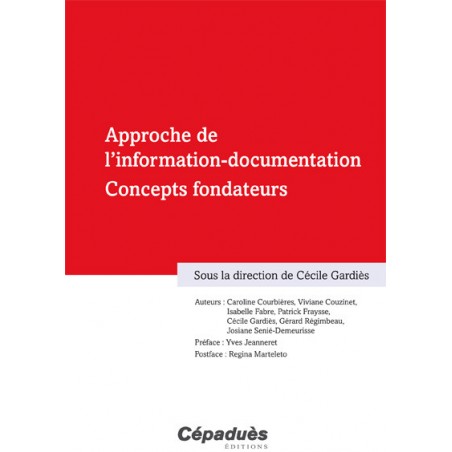





Cet ouvrage s'adresse aux spécialistes de l'information ainsi qu'aux étudiants et chercheurs en Sciences de l'information et de la communication.
Son objectif principal est d'appréhender le monde de l'information-documentation à partir des concepts info-communicationnels sous-jacents. Proposer des outils intellectuels pour interpréter, donner du sens, produire du savoir, mais aussi pour penser des actes et fonder la pratique, sous-entend une certaine vision de l'information-documentation au sein des Sciences de l'information et de la communication.
Au travers du choix de la théorisation, ces chapitres peuvent contribuer à l'opérationnalité des recherches, pour décrire, comparer, observer des phénomènes et contribuer à construire l'assise théorique de l'information-documentation transposable sur le terrain de l'activité professionnelle.

Commande avant 16h,
expédié le jour même (lu. - ve.)

Livraison express sous 48h.
| Référence : | 982 |
| Niveau : | spécialistes de l'information |
| Nombre de pages : | 232 |
| Format : | 14,5x20,5 |
| Reliure : | Broché |
| Rôle | |
|---|---|
| Gardiès Cécile | Auteur |
| Gardiès Cécile | Directrice de Collection |
APPROCHE DE L’INFORMATION-DOCUMENTATION : CONCEPTS FONDATEURS
PRÉFACE. YVES JEANNERET
SOMMAIRE
INTRODUCTION CÉCILE GARDIÈS
Bibliographie
CHAPITRE 1. QUESTIONS DE FONDATIONS
1-INFORMATION JOSIANE SENIÉ-DEMEURISSE ET VIVIANE COUZINET
1.1 DÉFINITIONS
1.1.1 L’information pour les praticiens de la documentation et pour les chercheurs
1.1.2 Information, connaissance et savoir
1.2 APPROCHES THÉORIQUES
1.2.1 Information et théorie mathématique
1.2.2 Information et Sciences de l’information-documentation
1.3 Approche typologique
1.3.1 L’information médiatique
1.3.2. L’information scientifique et technique
Conclusion
Bibliographie
2-DOCUMENT. PATRICK FRAYSSE
2.1. LA NOTION DE DOCUMENT : PREMIÈRES APPROCHES
2 1.1 De l’objet concret à ses dérivés
2.1.2 Documentation, Documentologie, Documentaliste
2.2. STABILITÉ, MATÉRIALITÉ ET INTENTIONNALITÉ
2.2.1 Document et événement
2.2.2 Document par intention et document par attribution
2.3 THÉORIES DU DOCUMENT : APPROFONDISSEMENTS
2.3.1 Oral, écrit, image : approche médiologique
2.3.2 Du support au sens : approche sémiologique
2.4 DU « TOUT DOCUMENT » AUX LIMITES DE LA NOTION
2.4.1 Document, Histoire et Patrimoine
2.4.2 À l’école du document
2.4.3 Les limites de la notion : vers une complexité documentaire
Conclusion
Bibliographie
3-MÉDIATION. GÉRARD RÉGIMBEAU
3.1 DÉFINITIONS
3.1.1 Médium
3.1.2 La médiation dans ses définitions
3.1.3 Les termes et le champ de la médiation.
3.2 THÉORIES DE LA MÉDIATION
3.2.1 Médiations et philosophie
3.2.2 Recherche en médiations
3.2.3 Médiation et médiologie
3.3 MÉDIATIONS DOCUMENTAIRES
3.3.1 Médiations et documentologie
3.3.2 Un exemple de médiation documentaire : l’image fixe
3.3.3 Le documentaliste médiateur
Conclusion
Bibliographie
CHAPITRE 2. QUESTION DE DISPOSITIFS INFO-COMMUNICATIONNELS
1- LES DISPOSITIFS : QUESTION DOCUMENTAIRE. VIVIANE COUZINET
1.1DÉFINITIONS
1.1.1 La notion de dispositif
1.1.2 Dispositif en Sciences de l’information et de la communication
1.2 DISPOSITIF DOCUMENTAIRE PRIMAIRE ET DISPOSITIF DOCUMENTAIRE SECONDAIRE
1.2.1 Dispositif documentaire primaire
1.2.2 Dispositif documentaire secondaire
1.3 « SOCIÉTÉ DE L’INFORMATION » ET DISPOSITIF DOCUMENTAIRE
1.3.1 « Société de l’information »
1.3.2 Dispositif documentaire
Conclusion
Bibliographie
2- LES LANGAGES DOCUMENTAIRES : ÉLÉMENTS D’ORGANISATION DES CONNAISSANCES. CAROLINE COURBIERES
2.1 APPROCHE DE LA NOTION
2.1.1 Rôles des langages documentaires
2.1.2 Langue, langage naturel, langage artificiel, langage documentaire
2.2 TYPOLOGIE DES LANGAGES DOCUMENTAIRES
2.2.1 Les langages de type classificatoire
2.2.2 Les langages de type combinatoire
2.3 PLURALITÉ DES LANGAGES DOCUMENTAIRES
2.3.1 Des codages différents
2.3.2 Des structures différentes
2.3.3 Des logiques différentes
2.3.4 Langage documentaire et outils informatiques
Conclusion
Bibliographie
3- L’ANALYSE DOCUMENTAIRE : ÉLÉMENTS D’ORGANISATION DES CONNAISSANCES
CAROLINE COURBIÈRES
3.1 PRINCIPE DE L’ANALYSE DOCUMENTAIRE
3.1.1 L'interprétation du document
3.1.2 L'horizon documentaire
3.2 LA REPRÉSENTATION DE L’INFORMATION
3.2.1 Le processus d’indexation 1
3.2.2 Indexation systématique et indexation analytique
3.2.3 Les résumés
Conclusion
Bibliographie
CHAPITRE 3. QUESTION D’APPROPRIATION DE L’INFORMATION
1 - DES PRATIQUES ÉRUDITES À LA RECHERCHE : BIBLIOGRAPHIE, BIBLIOLOGIE VIVIANE COUZINET
1.1 BIBLIOGRAPHIE
1.1.1 Définition 167
1.1.1.1 La technique bibliographique
1.1.1.2 Bibliographie et recherche scientifique
1.1.2 HISTORIQUE
1.1.2.1 Bibliographies générales et bibliographies sélectives
1.1.2.2 Les bibliographies spécialisées
1.1.2.3 Les bibliographies de bibliographies
1.2 BIBLIOLOGIE
1.2.1 DE LA BIBLIOGRAPHIE À LA SCIENCE DU LIVRE
1.2.2 Émergence de la bibliologie
1.3 BIBLIOMÉTRIE
1.3.1 LA BIBLIOMÉTRIE COMME MÉTHODE DE LA BIBLIOLOGIE
1.3.2 BIBLIOMÉTRIE ET SCIENTOMÉTRIE
Bibliographie
2- CULTURE DE L’INFORMATION, CULTURE INFORMATIONNELLE. CECILE GARDIES
2.1 SOCIÉTÉ DE L’INFORMATION ET ÉMERGENCE DU CONCEPT DE CULTURE DE L’INFORMATION
2.1.1 La société de l’information
2.1.2 Émergence du besoin de formation à l’information
2.2 ÉVOLUTION DES APPROCHES DE LA FORMATION À L’INFORMATION 2.2.1 Information literacy
2.2.2 Maîtrise de l’information, éducation à l’information, formation à l’information
2.3 LA FORMATION À L’INFORMATION DANS L’ENSEIGNEMENT
2.3.1 La formation à l’information dans l’enseignement secondaire
2.3.2 Des savoirs à enseigner ?
2.4 VERS UNE DIFFÉRENCIATION CULTURE DE L’INFORMATION / CULTURE INFORMATIONNELLE
2.4.1 Culture de l’information
2.4.2 Culture informationnelle
Conclusion
Bibliographie
3- USAGES ET PRATIQUES DE L’INFORMATION. JOSIANE SENIE-DEMEURISSE ET ISABELLE FABRE
3.1 UN ACTEUR DU SYSTÈME D’INFORMATION : L’USAGER
3.1.1 Évolution de l’approche usager des systèmes d’information
3.1.2 L’usager
3.2 LE BESOIN D’INFORMATION
3.2.1 La recherche d’information
3.3 DE L’USAGE DE L’INFORMATION AUX PRATIQUES INFORMATIONNELLES
3.3.1 L’usage
3.3.2 Les typologies d’usage
3.3.3 Les pratiques informationnelles
Conclusion
Bibliographie
POSTFACE
REGINA MARTELETO. À QUOI SERVENT LES RECHERCHES?
Livres de l'auteur Cécile Gardiès
Vous aimerez aussi